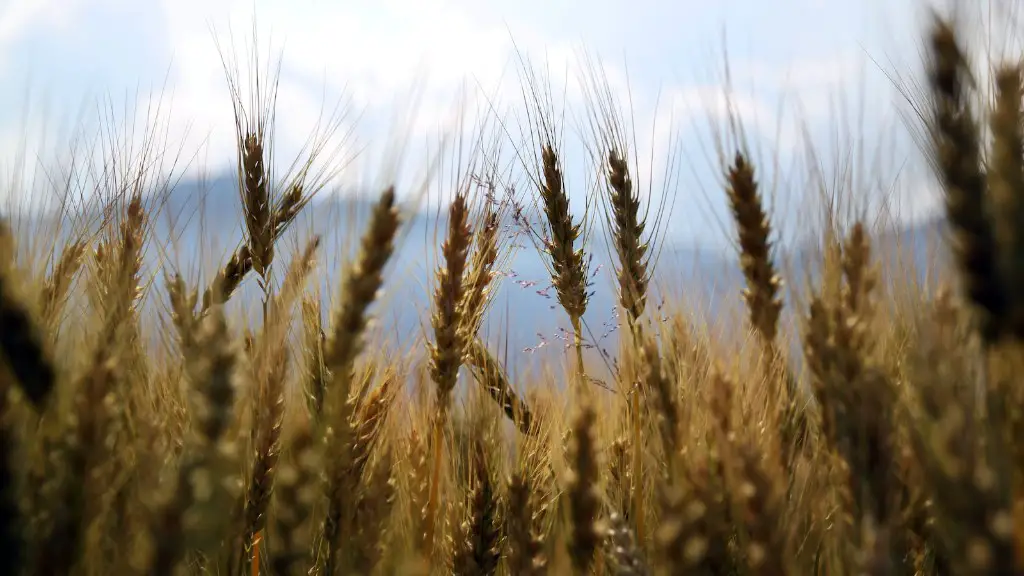In 1837, John Deere changed the course of American agriculture with his invention of the steel-tipped plow. This revolutionary tool enabled farmers to more easily turn over the thick, heavy soil of the American Midwest, allowing crops to be planted with greater speed and efficiency. As a result, farmers had more free time to devote to labor-saving projects such as building barns and acquiring livestock. In addition, the invention made crop rotation easier to implement, thus helping to prevent shortages and famines.
John Deere’s plow was a significant improvement over the cast iron and wooden plows that were previously used in America. The steel-tipped plow was much more durable, reducing the amount of time that had to be devoted to repair and maintenance. It was also lighter, making it easier for animals to pull it. The sharp blade of the plow cut through the soil more easily than its predecessors, resulting in superior results in terms of crop yields.
The steel-tipped plow had a profound effect on the American agricultural economy. Farmers were able to produce more food in less time, resulting in increased profits. This increased production also allowed for the establishment of more large-scale commercial farms, which helped to drive down the cost of food and expand the availability of food products.
John Deere’s invention also helped to spur the westward expansion of the United States in the 19th century. With the steel-tipped plow, farmers were able to break the soil of the American west, allowing them to establish farms in previously unsettled areas. This, in turn, helped to open up new markets for trade, further contributing to the nation’s economic growth.
The steel-tipped plow changed the course of American agriculture in many ways, and its impact is still felt today. It enabled the widespread development of commercial farms, prompted the westward expansion of the United States, and made crop rotation easier to implement. Above all, the invention of the steel-tipped plow allowed farmers to cultivate more land simultaneously, leading to increased productivity and greater profits.
The Plow’s Impact on Specialized Farming
The steel-tipped plow allowed farmers to cultivate larger and more contiguous plots of land, which in turn enabled them to specialize in a specific types of crops. On a large-scale farm, it was possible to devote an entire field to a particular crop and optimize production by taking advantage of soil differences. This new ability to specialize in a certain type of crop allowed farmers to take advantage of certain commodities markets and increase their profitability.
The steel-tipped plow also caused a shift in the labor market. By making it easier for farmers to cultivate more land, the plow enabled settlers to supplement their farming incomes with wages from other jobs. This allowed them to earn more money and afford more luxuries than they would have been able to previously, allowing for further growth of the agricultural economy.
The invention of John Deere’s plow changed the way that farmers planted crops, and changed the way that they interacted with each other and the market. By allowing farmers to specialize in certain types of crops and supplement their income with wages, the steel-tipped plow helped to shape the American agricultural economy and reshape the lives of Americans.
Effects of Increased Agricultural Production
The increased production capabilities enabled by the steel-tipped plow had ripple effects on the entire American economy. With more food being grown and more money being made, Americans were able to purchase more goods and services than before, creating jobs and stimulating economic growth in sectors beyond agriculture. This allowed for more people to enter into these other industries, which had an immense impact on the development of the American economy.
The increased agricultural production also enabled the American government to use food surpluses as a form of foreign aid. In times of famine, the United States was able to quickly provide necessary aid to stricken countries in order to provide relief and prevent further starvation.
The increased production capabilities of the steel-tipped plow also allowed for the development of new technologies and methods. Farmers were able to use these new technologies to further increase their yields, making food even more affordable and plentiful.
The Plow’s Impact on Society
The invention of the steel-tipped plow had a profound impact on American society. By allowing farmers to cultivate larger plots of land, the invention enabled the emergence of a much more affluent class of Americans. This new class of wealthy landowners had more leisure time and more disposable income, allowing them to contribute more to the nation’s overall economic growth. This new money also allowed for the development of cultural centers, allowing for the widespread dissemination of ideas and further advancing the country’s development.
In addition, the increased production capabilities enabled by the plow allowed for a greater availability of food, which had a significant impact on the health of the population at large. With more food available and at lower prices, people were able to improve their diets and reduce the incidence of various health problems.
The steel-tipped plow invented by John Deere changed the course of American agriculture and had far-reaching implications on the American economy and society as a whole. By allowing farmers to cultivate more land with greater efficiency and allowing for specialization in certain types of crops, the plow enabled the emergence of a more affluent class of landowners and increased production capabilities that had significant impacts on the economy, society, and foreign aid.
Health Benefits of Increased Agricultural Production
The increased agricultural production enabled by the steel-tipped plow also yielded immense health benefits. With more food available and at lower prices, people were able to improve their diets and reduce the incidence of various health problems. By providing a more nutrient-dense and varied diet, people could stay healthier and live longer.
The availability of more food also allowed for a larger population, which had an enormous impact on the overall health and well-being of the population. A larger population meant more people to share the burden of labor and take on specialized roles, allowing for further advances in medical science and technologies.
The availability of more food and greater population levels also allowed for the development of more vibrant and diverse communities. With more people living in close proximity to each other, ideas and cultures could be shared and exchanged more efficiently. This allowed for the development of more intricate social structures and advances in other areas of culture and society, such as music and literature.
The invention of the steel-tipped plow changed the course of American agriculture and had far-reaching implications on the health of the population. By allowing farmers to cultivate more land with greater efficiency and by increasing the availability of food, the plow enabled the emergence of a healthier population and improved overall well-being.
Improvements to the Steel-Tipped Plow over Time
The steel-tipped plow has gone through many changes since its invention in 1837. Steel blades have been replaced with titanium, making them tougher and more resistant to wear and tear. In addition, the plow has seen numerous design improvements, including the use of different angles and shapes in order to optimize the cutting of the soil. Finally, the plows have been increasingly mechanized and automated, allowing for better precision and faster implementation.
These improvements in the steel-tipped plow have allowed for greater cultivation and increased production capabilities for American farmers. As a result, farmers have been able to achieve more consistent yields and take advantage of more markets. This increased production has had numerous effects on the American agricultural economy, allowing for greater profits and more efficient trade in agricultural goods.
John Deere’s invention of the steel-tipped plow changed the course of American agriculture, and its influence is still felt today. By allowing farmers to cultivate more land with greater speed and efficiency, the steel-tipped plow has enabled the emergence of a more affluent class of landowners, increased agricultural production capabilities, and improved the health of the population. In addition, improvements to the steel-tipped plow have allowed for greater yields and efficiencies, further advancing the American agricultural economy.





